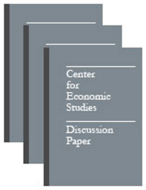Are All Trade Protection Policies Created Equal? Empirical Evidence for Nonequivalent Market Power Effects of Tariffs and Quotas
Are All Trade Protection Policies Created Equal? Empirical Evidence for Nonequivalent Market Power Effects of Tariffs and Quotas
Working Paper Number: CES-10-27
Abstract
The steel industry has been protected by a wide variety of trade policies, both tariff- and quota-based, over the past decades. This extensive heterogeneity in trade protection provides the opportunity to examine the well-established theoretical literature predicting nonequivalent effects of tariffs and quotas on domestic firms' market power. Robust to a variety of empirical specifications with U.S. Census data on the population of U.S. steel plants from 1967-2002, we find evidence for significant market power effects for binding quota-based protection, but not for tariff-based protection. There is only weak evidence that antidumping protection increases market power.
Others in Series
Working Paper
Computer Networks and Productivity Revisited: Does Plant Size Matter? Evidence and Implications
Working Paper
Employer-to-Employer Flows in the United States: Estimates Using Linked Employer-Employee Data
Working Paper
A Dynamic Structural Model of Contraceptive Use and Employment Sector Choice for Women in Indonesia
Page Last Revised - October 8, 2021




